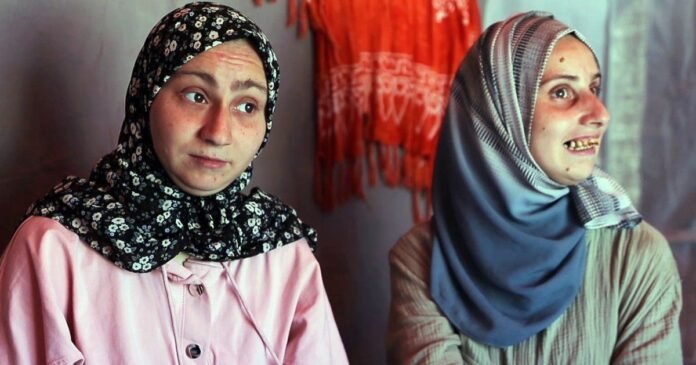Scared and confused, Aseel and Afaf live in a crowded displacement tent, lacking all forms of support, even food.
Shati refugee camp, Gaza – Inside a stifling tent in Shati, one of Gaza’s overcrowded displacement camps, 30-year-old Raneem Abu Al-Eish cares for her sisters, Aseel, 51, and Afaf, 33.
They sit close to Raneem, laughing at times and at others growing agitated when the cries of children playing outside get too loud.
Aseel and Afaf suffer from celiac disease and intellectual disabilities that impair their speech, understanding, and behaviour – conditions that have only deepened under the strain of war and displacement.
They struggle to express themselves, often overwhelmed by their environment, Raneem explains. While she doesn’t know the medical term for their condition, the symptoms at times mirror Tourette syndrome.
The cramped tent shelters seven family members: Raneem, her two sisters, their elderly parents, and another sister with her husband.
Raneem’s mother is frail, and her father is still recovering from an injury sustained in Israel’s relentless war on Gaza, leaving Raneem to shoulder their care alone.
The family used to live in Jabalia camp’s Block 2, until Israel destroyed their home eight months ago. Since then, they have moved from relatives’ homes to makeshift shelters, then to an overcrowded United Nations school.
Privacy and dignity are nearly impossible in the crowded tent. “When they need to change, we try to get the others to step out,” Raneem says. “But it’s not always possible.”
Yet that is only part of the ordeal for Aseel and Afaf, who are bullied daily due to their conditions.
“People don’t understand what my sisters go through,” Raneem says softly. “They judge by appearances, assuming they’re fine. But they aren’t. They need care, patience, dignity.”
Life in the camp overwhelms Aseel. “She finds it hard to cope with noise or sudden changes,” Raneem explains. “When that happens, she gets distressed – she shouts, cries, sometimes lashes out.”
Afaf, meanwhile, struggles with involuntary movements and impulsive behaviours. “A small argument or loud voice can trigger her,” Raneem adds.
‘People laugh, it devastates them’
“She doesn’t know how to control it,” she says, which makes it all the more sad that Afaf is frequently targeted for mockery, especially by children.
Using communal bathrooms brings repeated humiliation. “Every bathroom visit becomes a spectacle. People laugh, make cruel remarks, and it devastates them,” Raneem says.
Mohammad was the sibling most adept at navigating the outside world. “He got their medicines, managed hospital visits, dealt with aid agencies,” Raneem explains. “Without him, we’re completely alone.”
Since his detention, the sisters face worsening food shortages and a lack of medical care. “He was their protector,” Raneem says, her voice breaking. “Now we have no one.”
Between March and May, intensified bombing again displaced 436,000 Palestinians, many for the second, third or fourth time since the October 2023 beginning of the war. For families like Raneem’s – already in tents or shelters – each new wave of violence means starting over again, often without food or medicine.
For Aseel and Afaf, even basic nutrition is rife with threats. Celiac sufferers cannot eat gluten, which damages their small intestines.
In a starving Gaza where there is little to eat other than wheat-flour bread, which contains gluten, there is little chance that Raneem can find vegetables or meat for the sisters, especially with Mohammad detained.
Without gluten-free flour, Aseel and Afaf risk severe malnutrition, and they have gotten a dismally small amount of the 80 tonnes of gluten-free flour that aid agencies have thus far delivered to Gaza.
Much of it was blocked by closed borders, damaged roads, and broken distribution systems. “The little that reaches us is too expensive or too late,” Raneem says.
Before the war, Aseel and Afaf had routine medical care at Kamal Adwan Hospital.
Their conditions required special diets, medication, and regular therapy, needs now nearly impossible to meet.

